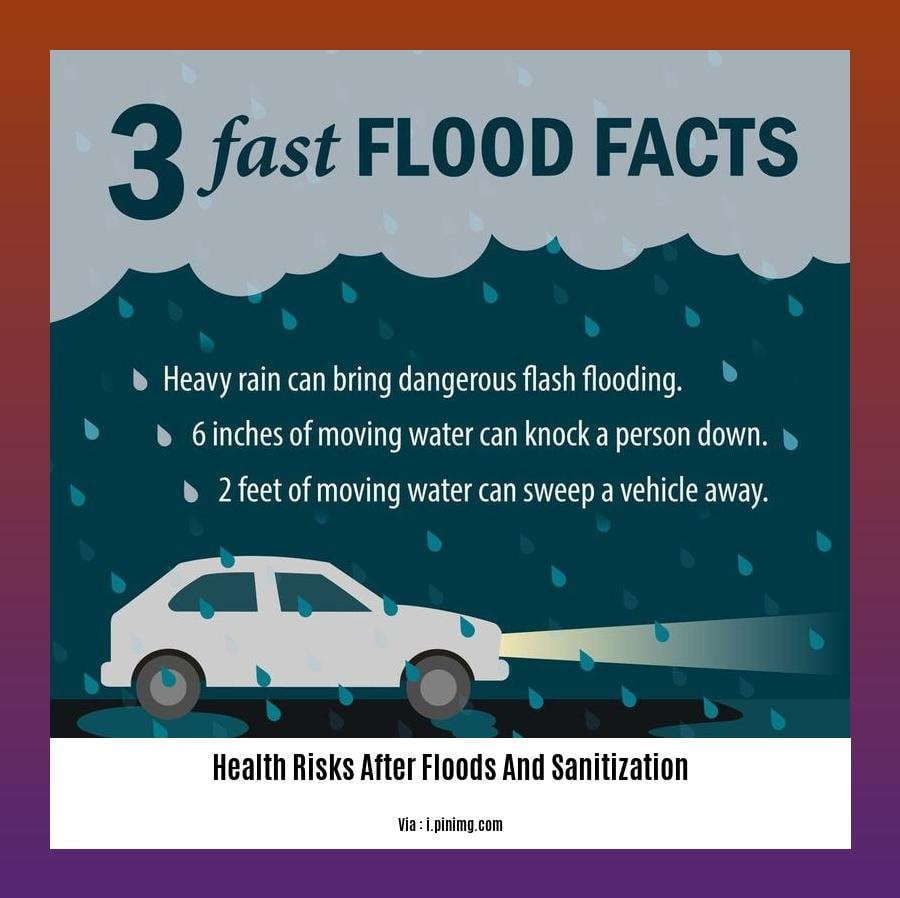Health Risks After Floods: The Importance of Sanitation and Hygiene Floods pose serious health risks due to contaminated water and damaged infrastructure. Understanding these risks is crucial for preventing disease outbreaks and ensuring public health. This article explores the health hazards associated with flood water and emphasizes the significance of proper sanitation and hygiene practices to safeguard human health in post-flood environments.
Key Takeaways:

- Flooding can spread infectious diseases due to contaminated water and poor sanitation.
- Respiratory issues can result from toxic chemicals, heavy metals, and mold in floodwaters.
- Vehicle safety can be compromised by even six inches of floodwater.
- Post-flood cleanup and disinfection are essential to prevent mold growth and reduce health risks.
Health Risks after Floods: The Importance of Sanitation
Flooding carries significant health risks due to contaminated water, unsanitary conditions, and potential chemical hazards. Proper sanitation and hygiene practices are paramount to prevent the spread of diseases and protect our health.
Key Health Concerns
- Waterborne Diseases: Contaminated floodwaters harbor bacteria, viruses, and parasites that can cause infections like diarrhea, typhoid, and cholera.
- Respiratory Issues: Mold spores, bacteria, and toxic chemicals in floodwaters can trigger asthma, allergies, and respiratory infections.
Sanitation and Hygiene Measures
- Clean Water: Boil or disinfect all drinking water before use. Avoid contact with contaminated water sources.
- Hygiene Practices: Wash your hands thoroughly and bathe regularly with soap and clean water.
- Proper Waste Disposal: Securely dispose of garbage and sewage in designated containers to prevent contamination.
- Surface Cleaning: Disinfect surfaces and belongings that came into contact with floodwaters using bleach or other disinfectants.
- Food Safety: Discard any food that has come into contact with floodwaters or has been stored in unsanitary conditions.
Steps for Post-Flood Clean-Up
- Remove standing water using pumps or buckets.
- Open windows and doors for ventilation.
- Dry all wet surfaces thoroughly using fans or dehumidifiers.
- Disinfect surfaces with bleach or other disinfectants.
- Remove all debris and contaminated materials.
- Wash all clothing and bedding in hot water.
- Seek medical attention promptly if you experience any symptoms of infection or respiratory distress.
Remember, post-flood sanitation and hygiene are crucial for safeguarding your health. By adhering to these measures, we can mitigate the health risks after floods and protect ourselves and our communities.
To prevent the health risks that come after floods, learn how to detect mold growth, avoid contaminated floodwaters, and safely re-entering and cleaning flooded homes.
Flood Water Contamination
As a journalist specializing in health and environmental issues, I’ve seen the devastating impact of floods on communities firsthand. Flood water contamination poses significant health risks, making it crucial to take proper precautions.
Key Takeaways:
- Floodwater can harbor harmful microorganisms: Bacteria, viruses, and fungi can contaminate floodwater, leading to infections and gastrointestinal illnesses.
- Sanitation is essential: Improper sanitation practices can increase the risk of waterborne diseases. Boil or disinfect water before drinking and maintain proper hygiene.
- Avoid direct contact: Minimize exposure to floodwater to reduce the risk of infection. If exposed, wash your hands thoroughly and clean any wounds.
- Flooding may contaminate soil and groundwater: This can pose long-term health risks and require professional cleanup.
- Follow safety guidelines: Stay informed about flood warnings and follow official safety recommendations.
Remember, while floods can be unpredictable, taking these precautions can help protect your health and prevent the spread of disease.
Relevant URL Source:
Health Effects Of Flooding
Navigating the Potential Health Risks
Flooding presents immediate and long-lasting health hazards, threatening the well-being of communities. Contaminated water, displaced populations, and damaged infrastructure heighten the risk of disease outbreaks, respiratory issues, and other health complications. Understanding these Health Effects Of Flooding and implementing proper preventive measures is crucial for safeguarding public health.
Key Takeaways:
- Toxic Threats: Floods introduce an array of toxic substances, including heavy metals, pesticides, biotoxins, and sewage, posing risks to human health upon contact or inhalation.
- Mold Menace: Damp conditions and organic matter in floodwaters provide a fertile breeding ground for mold, releasing spores that can trigger respiratory problems and allergic reactions.
- Respiratory Hazards: Exposure to floodwaters contaminated with toxic chemicals and mold can lead to asthma, bronchitis, and pneumonia.
- Waterborne Diseases: Contaminated floodwaters harbor microorganisms that can cause инфекции and gastrointestinal illnesses.
- Sanitation Concerns: Disruptions to sanitation systems during floods increase the risk of waterborne diseases and skin infections.
Protective Actions:
- Avoid direct contact with floodwaters.
- Clean and disinfect all surfaces exposed to floodwaters using appropriate methods.
- Remove and dispose of moldy materials promptly and safely.
- Boil or disinfect water before consumption to eliminate waterborne pathogens.
Additional Resources:

FAQ
Q1: What are the common health risks associated with flooding?
A1: Exposure to floodwater can lead to infections, gastrointestinal illnesses, and skin rashes. The contaminated water can also cause respiratory issues and affect long-term health due to soil and groundwater contamination.
Q2: How can floodwater contaminate drinking water and sanitation systems?
A2: Floodwater can contaminate water supplies and sanitation systems, increasing the risk of waterborne diseases. It’s crucial to boil or disinfect water before drinking it in flooded areas.
Q3: What steps should I take to prevent infection after exposure to floodwater?
A3: If exposed to floodwater, wash your hands thoroughly, and clean and disinfect any wounds or rashes promptly. Avoid contact with floodwater as much as possible.
Q4: How can I prevent mold growth after flooding?
A4: Damp conditions and organic matter in floodwaters foster mold growth, which can release spores harmful to respiratory health. Clean and disinfect surfaces exposed to floodwaters, and remove moldy materials promptly.
Q5: What are the long-term health risks associated with flooding?
A5: Flooding can lead to long-term health risks due to contaminated soil and groundwater. Exposure to floodwater can increase the risk of infections, respiratory issues, and other health problems in the future.










